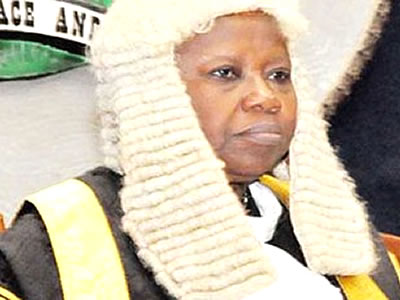The Chief Justice of Nigeria, Mariam Mukhtar has called on the Nigerian Police Force to reduce the serious delays in the criminal justice system by seeking out evidence on suspects before arresting and charging them to court.
Mukhtar made the call against the “unwholesome practice” while speaking at a special session organised by the Supreme Court to mark the commencement of the 2013/2014 Legal Year, as well as the inauguration of 17 new Senior Advocates of Nigeria in Abuja on Monday.
She said, “It is common knowledge that our security agencies usually rush to the courts with suspects, before looking for evidence to prosecute them.
“The persistent use of the ‘Holden Charge’ by these agencies to detain awaiting trial suspects, is a major contributor to the high number of cases pending in our courts.”
She called on the Force to emulate international best practices in Policing, and obtain adequate evidence before arresting suspects.
She said, “This procedure is a far cry from what obtains in other democracies, where discrete surveillance is placed on crime suspects who are painstakingly stalked by security agents, until such a time when enough evidence would have been obtained for their arrest, arraignment and prosecution.
“But in Nigeria, suspects are promptly arrested and often times arraigned in court, even when no evidence for prosecution has been gathered.
“The backlash from such failure of proper investigation by our security agencies is the resultant hike in the number of cases pending in the courts.”
The CJN also lamented over the slow pace of judicial administration in the country.
“To exhaust complete remedy in a case, that is from trial court to Supreme Court, could take up to 20 years with the original litigants dead and substituted and in some cases the substitutes also dead and substituted,” she said.

